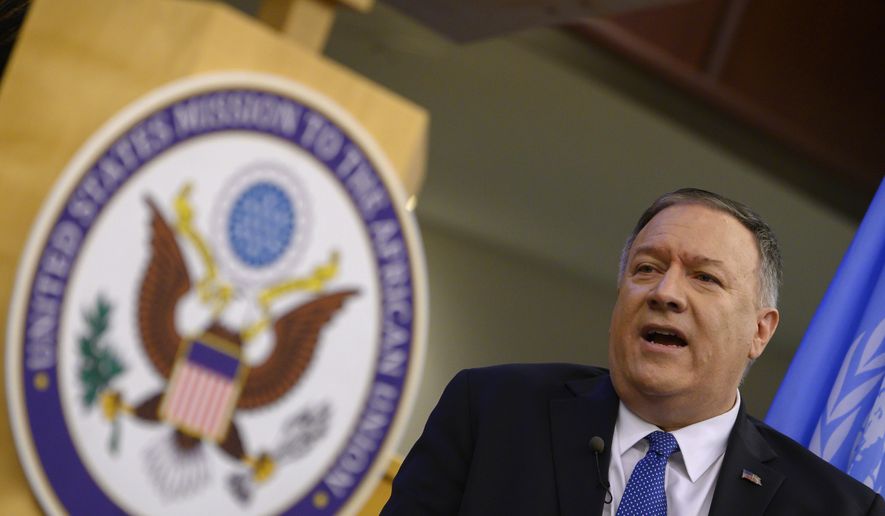President Trump and Secretary of State Mike Pompeo have taken the cause of religious freedom in U.S. foreign policy to an unprecedented degree, but the creation of a formal alliance of more than two dozen allies has raised as many questions as answers about the specifics.
State Department officials last week released a list of 27 countries that have joined the International Religious Freedom Alliance, pledging to address what they said is the persecution of millions of Christians, Muslims, Jews, Buddhists and other religious adherents by regimes around the world.
“Egregious perpetrators of religious persecution have long operated with impunity,” Mr. Pompeo said in an announcement of the grouping. “The alliance will unify powerful nations and leverage their resources to stop bad actors and advocate for the persecuted, the defenseless and the vulnerable.”
Trump administration officials say soaring levels of persecution against religious minorities, particularly in the Middle East and Asia, prompted the U.S. to enlist allies and create a formal structure to fight “bad actors” and oppressive governments. Members of the alliance include U.S. allies Britain and Israel, a slew of Eastern European countries and Latin American powers Colombia and Brazil.
Brazil, Poland, Ukraine and other members have tried to cultivate better political and security ties with the Trump administration as well.
Mr. Pompeo said the “threats to religious freedom are global” and thus require a worldwide effort to stop violators from having the upper hand. But critics, citing notable inconsistencies in U.S. priorities, question the effectiveness and comprehensiveness of the administration’s approach.
A 2019 report from the U.S. Commission on International Religious Freedom found that persecution of religious adherents remains widespread, affecting evangelical Christians, Jehovah’s Witnesses, Muslims and other minority groups. The report designated countries of particular concern for “severe violations of religious freedom.” The top tier includes China, Pakistan, North Korea, Nigeria, Syria and Russia — none of which has signed up for the alliance.
Religious-based persecution, whether of Christians in the Middle East, Buddhists in Tibet or Uighur Muslims in China’s Xinjiang region, is on the rise, said Nadine Maenza, vice chair of the U.S. commission. Freedom of religion, she said, is not just an American or a Western value, but a global right for all.
“We need more voices saying everyone has the right to freedom of religion, thought, conscience or belief,” Ms. Maenza said. “It can’t be just an American-advocated right.”
She said she hopes the alliance members will serve as “loud advocates” for the free practice of religion.
Still, it is uncertain how the countries will address specific issues of persecution and where the alliance will focus its efforts and resources.
Moving ahead
According to background from a State Department official, the Trump administration is planning to convene with alliance members in the coming months to discuss specifics of how the alliance will defend people facing persecution.
The Trump administration has made freedom of religion a centerpiece of its domestic and foreign policy agendas, reflecting in part Mr. Trump’s strong political support among evangelicals and Christian conservatives. But critics say the political is outweighing the moral in the administration’s approach and that its stated principals have significant inconsistencies.
The alliance was announced a month after a federal judge blocked a Trump administration mandate that would allow local and state governments to reject the admission of refugees seeking asylum in their areas. The judge ruled that giving state and local governments the option to deny refugees access to certain regions conflicted with established federal law and did not serve “overall public interest.”
Skeptics also have noted the administration’s travel ban for a number of Muslim-majority nations and said Mr. Trump has cultivated personal ties with the leaders of Saudi Arabia and North Korea despite their presence on the list of worst offenders of religious freedom.
Mr. Trump and White House officials have repeatedly defended the travel restriction as a security measure and not as an anti-Muslim initiative.
But geopolitical concerns inevitably hover over any major multilateral initiative. Taiwan was excluded from the alliance despite its strong record on religious liberty in part because of concerns about how China would react.
Mr. Trump’s “America First” foreign policy makes an awkward fit with an initiative to enlist allies in a common cause, some say.
“How can the U.S. be taken seriously when Rohingya Muslims from Myanmar or Sudanese Christians or other persecuted groups are unable to enter the U.S. due to [the travel] ban?” Philippe Nassif, Middle East and North Africa advocacy director for Amnesty International, asked in a recent Voice of America interview.
Officials with the International Religious Freedom Alliance and the State Department say the cynicism is misplaced.
“Promoting and protecting religious freedom is not at odds with protecting the American people,” said a State Department official, speaking on background.
The countries in the core coalition were chosen based on their histories of promoting freedom of religion, and the State Department hopes to add more to the alliance in the coming months, the official said.




Please read our comment policy before commenting.